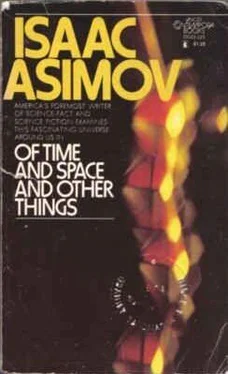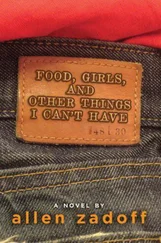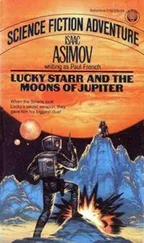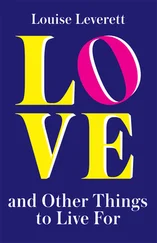Isaac Asimov - Of Time and Space and Other Things
Здесь есть возможность читать онлайн «Isaac Asimov - Of Time and Space and Other Things» весь текст электронной книги совершенно бесплатно (целиком полную версию без сокращений). В некоторых случаях можно слушать аудио, скачать через торрент в формате fb2 и присутствует краткое содержание. Год выпуска: 1972, ISBN: 1972, Издательство: Lancer Books, Жанр: Прочая научная литература, на английском языке. Описание произведения, (предисловие) а так же отзывы посетителей доступны на портале библиотеки ЛибКат.
- Название:Of Time and Space and Other Things
- Автор:
- Издательство:Lancer Books
- Жанр:
- Год:1972
- ISBN:ISBN: 0-447-33023-3
- Рейтинг книги:4 / 5. Голосов: 1
-
Избранное:Добавить в избранное
- Отзывы:
-
Ваша оценка:
- 80
- 1
- 2
- 3
- 4
- 5
Of Time and Space and Other Things: краткое содержание, описание и аннотация
Предлагаем к чтению аннотацию, описание, краткое содержание или предисловие (зависит от того, что написал сам автор книги «Of Time and Space and Other Things»). Если вы не нашли необходимую информацию о книге — напишите в комментариях, мы постараемся отыскать её.
Of Time and Space and Other Things — читать онлайн бесплатно полную книгу (весь текст) целиком
Ниже представлен текст книги, разбитый по страницам. Система сохранения места последней прочитанной страницы, позволяет с удобством читать онлайн бесплатно книгу «Of Time and Space and Other Things», без необходимости каждый раз заново искать на чём Вы остановились. Поставьте закладку, и сможете в любой момент перейти на страницу, на которой закончили чтение.
Интервал:
Закладка:
In 1752, Great Britain and her colonies (some two centuries later than Catholic Europe) abandoned the Julian calendar and adopted the astronomically more cor rect Gregorian calendar (see Chapter 1). Nearly half a century later, Pike was still giving rules for solving com plex calendar-based problems for the Julian calendar as well as for the Gregorian. Isn't it nice to have forgotten the Julian calendar?
Wouldn't it be nice if we could forget most of calendri cal complications by adopting a rational calendar that would tie the day of the month firmly to the day of the week and have a single three-month calendar serve as a perpetual one, repeating itself over and over every three months? There is a world calendar proposed which would do just this.
It would enable us to do a lot of useful forgetting.
I would like to see the English language come into worldwide use. Not necessarily as the only language or even as the major language. It would just be nice if every one-whatever his own language was-could also speak English fluently. It would help in communications and per haps, eventually, everyone would just choose to speak English.
That would save a lot of room for other things.
Why English? Well, for one thing more people speak English as either first or second language than any other language on Earth, so we have a head start. Secondly, far more science is reported in English than in any other lan guage and it is communication in science that is critical today and will be even more critical tomorrow.
To be sure, we ought to make it as easy as possible for people to speak English, which means we should rational ize its spelling and grammar.
English, as it is spelled today, is almost a set of Chinese ideograms. No one can be sure how a word is pronounced by looking at the letters that make it up. How do you pronounce: rough, through, though, cough, hiccough, and lough; and why is it so terribly necessary to spell all those sounds with the mad letter combination "ough"?
It looks funny, perhaps, to spell the words ruff, throo, thoh, cawf, hiccup, and lokh; but we already write hiccup and it doesn't look funny. We spell colour, color, and centre, center, and shew, show and grey, gray. The result looks funny to a Britisher but we are us 'ed to it. We can get used to the rest, too, and save a lot of wear and tear on the brain. We would all become more intelligent, if intelligence is measured by proficiency at spelling, and we'll not have lost one thing.
And grammar? Who needs the eternal hair-splitting arguments about "shall" and "will" or "which" and "that"?
The uselessness of it can be demonstrated by the fact that virtually no one gets it straight anyway. Aside from losing valuable time, blunting a child's reasoning faculties, and instilling him or her with a ravening dislike for the English language, what do you gain?
If there be some who think that such blurring of fine distinctions will ruin the language, I would like to point out that English, before the grammarians got hold of it, had managed to lose its gender and its declensions almost everywhere except among the pronouns. The fact that we have only one definite article (the) for all genders and cases and times instead of three, as in French (le, la, les) or six, as in German (der, die, das, dem, den, des) in no way blunts the English language, which remains an ad mirably flexible instrument. We cherish our follies only because we are used to them and not because they are not really follies.
We must make room for expanding knowledge, or at least make as much room as possible. Surely it is as im portant to forget the old and useless as it is to learn the new and important.
Forget it, I say, forget it more and more. Forget it!
But why am I getting so excited? No one is listening to a word I say.
12. Nothing Counts
In the previous chapter, I spoke of a variety of things; among them, Roman numerals. These seem, even after five centuries of obsolescence, to exert a peculiar fascination over the inquiring mind.
It is my theory that the reason for this is that Roman numerals appeal to the ego. When one passes a corner stone which says: "Erected MCMXVIII," it gives one a sensation of power to say, "Ah, yes, nineteen eighteen" to one's self. Whatever the reason, they are worth further discussion.
The notion of number and of counting, as well as the names of the smaller and more-often-used numbers, date back to prehistoric times and I don't believe that there is a tribe of human beings on Earth today, however primitive, that does not have some notion of number.
With the invention of writing (a step which marks the boundary line between "prehistoric" and "historic"), the next step had to be taken-numbers had to be written.
One can, of course, easily devise written symbols for the words that represent particular numbers, as easily as for any other word. In English we can write the number of fingers on one hand as "five" and the number of digits on all four limbs as "twenty."
Early in the game, however, the kings' tax-collectors, chroniclers, and scribes saw that numbers bad t-he pe culiarity of being ordered. There was one set way of count ing numbers and any number could be defined by counting up to it. Therefore why not make marks which need be counted up to the proper number.
Thus, if we let "one" be represented as ' and "two" as and "three" as "', we can then work out the number indicated by a given symbol without trouble. You can see, for instance, that the symbol stands for "twenty-three." What's more, such a symbol is universal.
Whatever language you count in, the symbol stands for the number "twenty-three" in whatever sound your par ticular language uses to represent it.
It gets hard to read too many marks in an unbroken row, so it is only natural to break it up into smaller groups. If we are used to counting on the fingers of one hand, it seems natural to break up the marks into groups of five.
"Twenty-three" then becomes "' @" 'if" fl@lf "f. If we are more sophisticated and use both hands in counting, we would write it fl"pttflf '//. If we go barefoot and use our toes, too, we might break numbers into twenties.
All three methods of breaking up number symbols into more easily handled groups have left their mark on the various number systems of mankind, but the favorite was division into ten. Twenty symbols in one group are, on the whole, too many for easy grasping, while five symbols in one group produce too many groups as numbers grow larger. Division into ten is the happy compromise.
It seems a natural thought to go on to indicate groups of ten by a separate mark. There is no reason to insist on writing out a group of ten as Ifillittif every time, when a separate mark, let us say -, can be used for the purpose.
In that case "twenty-three" could be written as - "'.
Once you've started this way, the next steps are clear.
By the time you have ten groups of ten (a hundred), you can introduce another symbol, for instance +. Ten hun dreds, or a thousand, can become = and so on. In that case, the number "four thousand six hundred seventy-five" can be written - ++++++
To make such a set of symbols more easily graspable, we can take advantage of the ability of the eye to form a pattern. (You know how you can tell the numbers displayed by a pack of cards or a pair of dice by the pattern itself.)
We could therefore write "four thousand six hundred sev enty-five" as
And, as a matter of fact, the ancient Babylonians used just this system of writing numbers, but they used cunei form wedges to express it.
The Greeks, in the earlier stages of their development, used a system similar to that of the Babylonians, but in later times an alternate method grew popular. They made use of another ordered system-that of the letters of the alphabet.
Читать дальшеИнтервал:
Закладка:
Похожие книги на «Of Time and Space and Other Things»
Представляем Вашему вниманию похожие книги на «Of Time and Space and Other Things» списком для выбора. Мы отобрали схожую по названию и смыслу литературу в надежде предоставить читателям больше вариантов отыскать новые, интересные, ещё непрочитанные произведения.
Обсуждение, отзывы о книге «Of Time and Space and Other Things» и просто собственные мнения читателей. Оставьте ваши комментарии, напишите, что Вы думаете о произведении, его смысле или главных героях. Укажите что конкретно понравилось, а что нет, и почему Вы так считаете.












